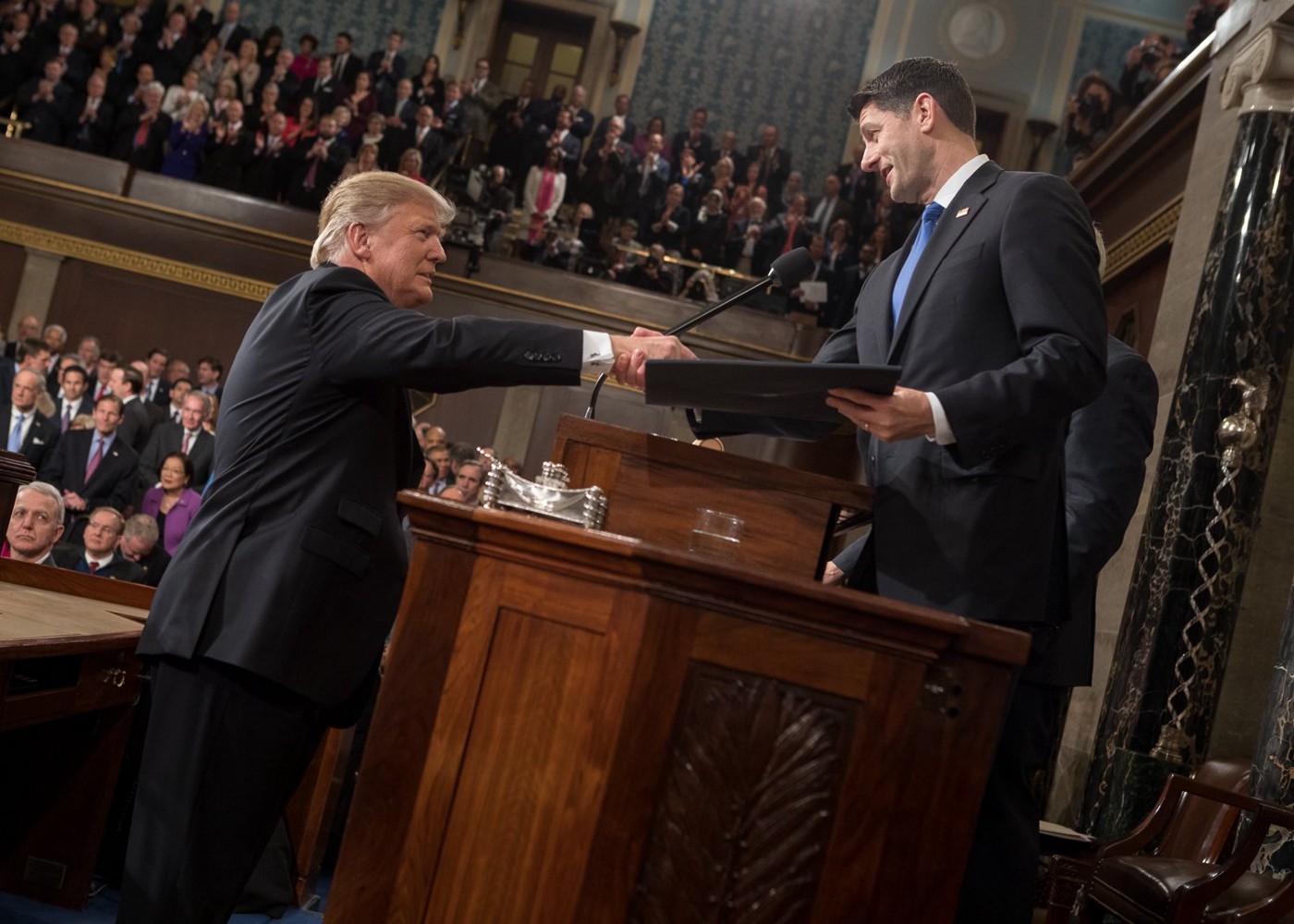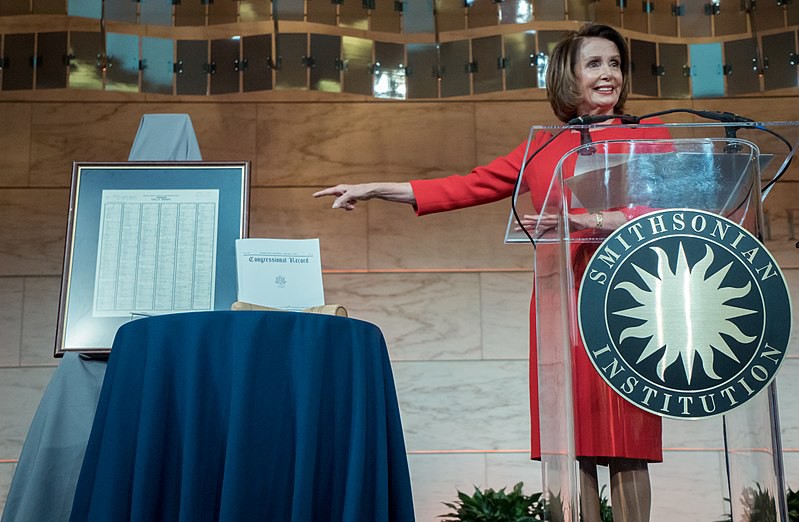Leadership elections are currently shaping the 2019 House of Representatives.

President Donald J. Trump, Vice President Mike Pence, and Republican Legislators celebrate the passage of the Tax Cuts Act | December 20, 2017 (Official White House Photo by Joyce N. Boghosian)
The U.S. 2018 mid-term elections gave Democrats the majority in the House of Representatives with a gain of 32 seats; will they start 2019 in disarray or will House Democrats unite behind Rep. Nancy Pelosi for Speaker of the House?
House Republicans have already elected Rep. Kevin McCarthy (R-CA) to be Minority Leader in 2019; is he ready to support President Trump’s agenda and unite House Republicans after the ill-timed retirement of House Speaker Paul Ryan?
House Republicans Select Rep. Kevin McCarthy

Even before Speaker of the House Paul Ryan announced his retirement in April, current Majority Leader Kevin McCarthy (R-CA) was seen by many Republicans in the House as his natural successor. Ryan even endorsed McCarthy to replace him.
In spite of a weak bid from Freedom Caucus co-founder and outspoken conservative Rep. Jim Jordan (R-OH), who didn’t manage enough support to constitute a serious challenge, McCarthy cinched the new Minority Leader post on November 14, 2018. McCarthy defeated Jordan in a vote of 159 to 43 and the two shook hands amicably after two days of closed-door meetings.
Republicans, and the people who voted for them, hope McCarthy can unite the moderate and conservative branches of his party and move quickly past any attempt at assigning blame for Republican losses during the 2018 election. Can Kevin McCarthy pick up the broken pieces left by Paul Ryan’s poorly-timed retirement?
And, as a Trump Republican, will McCarthy be able cooperate effectively with his Democratic colleagues to make any progress on the President’s agenda?
A Tale of Two Speakers

The Reluctant Speaker of the House
Earnest and genteel, Paul Ryan is not ideally suited for full-contact politics in the age of President Donald Trump. Ryan’s dream, in the great tradition of a true statesman, was simply to leave his enduring mark on American social and fiscal policies. As an authentic fiscal conservative, he wanted to control the unsustainable national debt by reshaping safety-net programs like Medicare, Medicaid and Social Security.
He almost left politics in 2012 when the Romney/Ryan Presidential ticket lost to Obama/Biden; but he stayed for his dream job as Chairman of Ways and Means. When John Boehner retired in 2015, riding out on a wave of unified Republican antipathy, Paul Ryan bowed to pressure from his colleagues to replace Boehner as Speaker of the House. Perhaps he shouldn’t have; even then, he was tiring of Capitol Hill.
Ryan left his ideal job as chairman of the Ways and Means Committee to take up the Speakers gavel and prepared to lead deeply divided Republicans through a difficult election season. He worried a Hillary Clinton presidential victory might upend his hopes for entitlement reform.
The Republican nomination, and subsequent upset election, of Donald Trump was something Paul Ryan was never prepared for, was very reluctant to accept and never seemed to fully embrace. Ryan, ever the mild-mannered and deeply conservative policy man, had trouble navigating the constantly churning waters around Trump from the very beginning.
“I’m not saying I’m not voting for him at all. I’m just changing my focus to make sure that I’m adhering to my first responsibility, which is those of us in the House.” -Speaker Paul Ryan on a conference call about then Republican nominee Donald Trump
Trump, never one to back down from a perceived insult, took to his usual platform in retort, leaving little doubt as to his feelings about Paul Ryan:
“Our very weak and ineffective leader, Paul Ryan, had a bad conference call where his members went wild at his disloyalty.” -Donald Trump, twitter
Both publicly and privately, Ryan ignored the jabs. But Trump supporters, like Trump himself, weren’t shy about voicing their displeasure. On the campaign trail, Ryan endured a great deal of criticism and hostility for his tepid support of Trump.
After Trump was elected, the two men seem never to have spoken of their past disagreements. Ryan seemed cheerful about the Republican victory, calling Trump’s win the “most incredible political feat in my lifetime,” and they went to work. “The past is the past.” Ryan told Fox News.
In the time since, Ryan has been considered a relatively weak Speaker. Securing the President’s signature has meant overlooking a foul-mouthed communication style, a rejection of conservative ideology and a populist leaning; in this environment, Ryan’s retirement should come as no surprise. What does surprise is the timing that seems almost designed to punish, as it left House Republicans no opportunity to select another Speaker before mid-term elections, no leadership and no campaign funds for close races.
The House Underdog
In contrast, Rep. Kevin McCarthy wants Republican House leadership; and McCarthy wants a Republican Majority back in the House.
“We think he’s absolutely our best political strategist, our best fundraiser, our best recruiter. And that’s job №1 in getting back the majority.” -said Rep. Tom Cole (R-OK) of Kevin McCarthy.
Unlike Paul Ryan, Kevin McCarthy has had an eye on leadership since he was elected to the House in 2007, an ambition thwarted in 2015 when he unsuccessfully ran to replace retiring Speaker John Boehner. A group of conservatives, led by Jim Jordan, opposed him and McCarthy threw his support behind Paul Ryan.
A friend of President Trump, current Majority Leader Kevin McCarthy is many things Paul Ryan is not. While Ryan is well-known as a policy mastermind, McCarthy is a persuasive speaker and a strong fundraiser. Paul Ryan is a consummate diplomat and a crusader, bringing his deeply held if previously untouchable belief in entitlement reforms into the mainstream of the Republican Party. Kevin McCarthy is a negotiator, a deal-maker who has worked very hard to win over the House conservatives who fared far better than their moderate counterparts in the 2018 elections.
In January 2019, Republican Minority Leader Kevin McCarthy will officially undertake the hard-fought post he has won; can he protect the Trump Presidential agenda and build the GOP back into a majority?
“We’ll be back,” says McCarthy.

Will McCarthy be able to block impeachment?
McCarthy may be the friendly face of the Republican Party, but Rep. Jim Jordan, who is also well-liked by President Trump, may be better suited to fight Democrat investigations into the Trump Administration and Trump’s businesses.
“We will work with anybody across that aisle if they are there to work to move America forward. But let me be very clear, if their agenda is simply investigations, impeachment, and not focused on the hardworking American public, we will be there to defend the American public.” -Rep. Kevin McCarthy
Will he even have to? Some key Democrats have been signaling wavering in their support of impeachment in the past weeks since the 2018 mid-term election.
Republican Leadership Elections
Also on the House Republican leadership team will be GOP Whip Steve Scalise (R-LA), who was unanimously voted to his position on November 14, 2018.
Daughter of former Vice President Dick Cheney, Rep. Liz Cheney (R-WY) will take over the №3 spot of Republican conference chair.
Rep. Jim Jordan seems likely for the ranking member spot on the Judiciary Committee, a post which would well position him to counter Democratic investigations led by Rep. Jerry Nadler (D-NY). The House GOP Steering Committee is expected to make the decision after Thanksgiving.
Rep. Michael McCaul is the best candidate to lead House Republicans on the Foreign Affairs Committee, because McCaul Has A Proven Record On Foreign Affairs. That decision is also set for after the Thanksgiving holiday.

Nancy Pelosi (D-CA) Speaker of the House
Opposition to Nancy Pelosi’s tireless campaign for the Speaker gavel continues to dwindle. Of the original group of 17 Democrats who signed a letter indicating their intent to oppose Pelosi, only a few remain. Support for opposing Pelosi is also losing ground as no other Speaker candidates have materialized.
House Democrats, who will not hold their election for Speaker of the House until after the Thanksgiving break, will soon make the final determination on whether Pelosi will resume the Speaker gavel in the House once again.
Democrats may have taken the majority in the House of Representatives, but Republicans still hold the Senate and President Trump sits in the White House. If Democrats want change, they should elect Nancy Pelosi Speaker of the House.
(contributing writer, Brooke Bell)